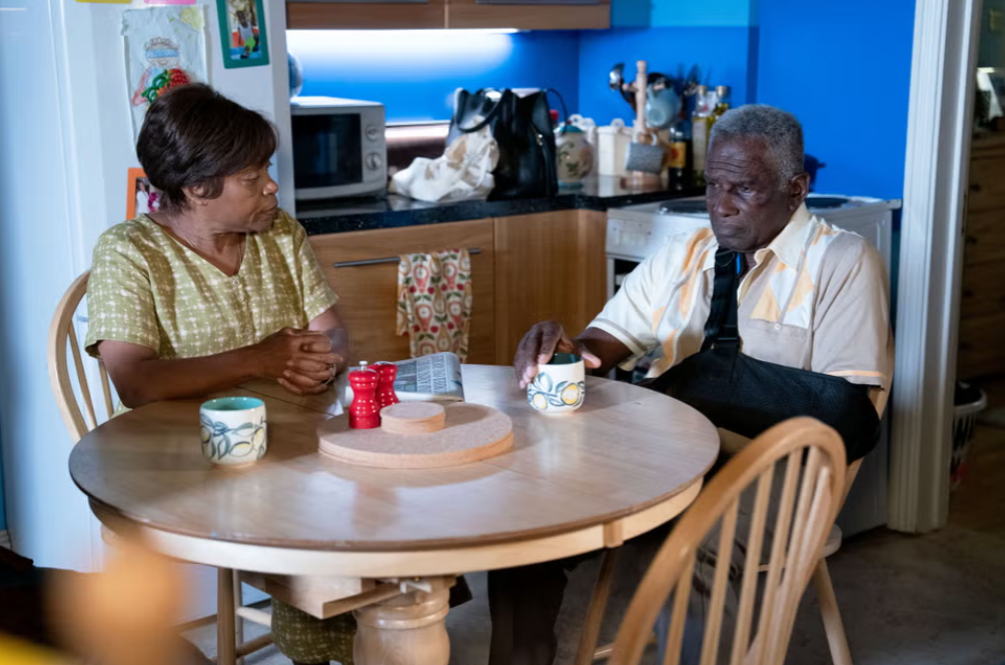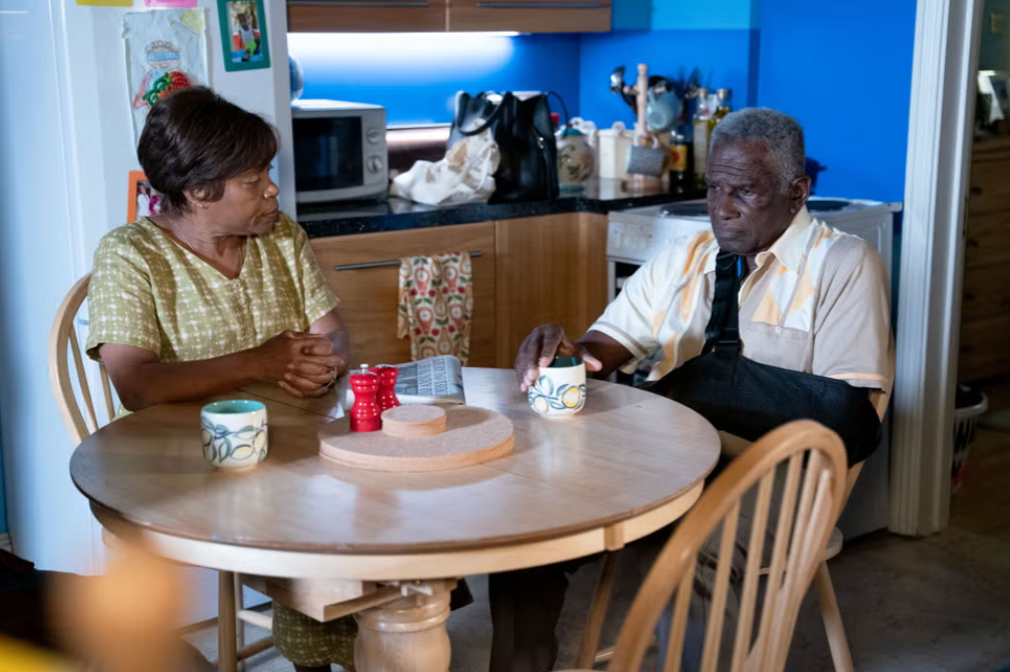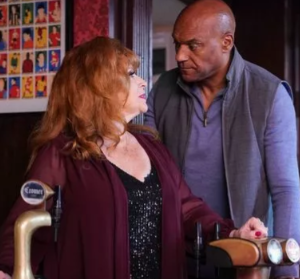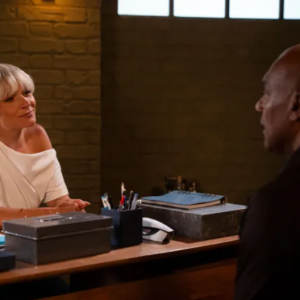The familiar, comforting rhythm of Albert Square has been brutally disrupted by a shocking act of violence that has left beloved resident Patrick Trueman reeling, facing not just physical recovery but a profound psychological struggle. His recent return home from the hospital, following a brutal attack, signals the beginning of a difficult new chapter, casting a long shadow over both Patrick and the conscience of someone close to him: Howie Danes.
The harrowing incident unfolded when the troubled teenager Oscar Branning, driven by a desperate need for £5,000 to appease a threatening Mike, set his sights on No. 20 Albert Square. Unbeknownst to Oscar, his luck, or rather his misfortune, would intertwine with Patrick’s recent win at the betting shop. Fresh from his success and presumably in high spirits, Patrick returned home, only to be confronted by Oscar, already inside his sanctuary. The confrontation escalated rapidly, culminating in Oscar shoving Patrick to the floor. The elderly Walford staple, known for his resilience and warm heart, fell unconscious, a devastating sight that marked a tragic turn for both perpetrator and victim. The arrival of Howie Danes on the scene moments later, while critical in preventing further harm, also allowed the panicked Oscar to make his escape, his identity shrouded in the immediate chaos.
In the days that followed, the weight of the secret became almost unbearable. Howie, through his own investigations, pieced together the puzzle, confirming his suspicions that Oscar was indeed responsible for Patrick’s ordeal. Faced with a moral dilemma of immense proportions, Howie struck a covert deal with Oscar and Lauren Branning: he would keep Oscar’s secret from the police in exchange for Patrick’s stolen winnings. This decision, born perhaps from a misguided attempt to protect a troubled youth or to avoid further conflict, has inadvertently shackled Howie to a profound sense of guilt, a burden that threatens to consume him as Patrick grapples with his trauma.

Patrick’s physical injuries, while severe enough to warrant hospitalisation, were, by all accounts, not as dire as they could have been. Yet, the true damage extends far beyond visible bruises and contusions. The attack has left deep-seated mental scars, a pervasive anxiety that now governs his every move. The sanctity of his home, once a bastion of safety and comfort, has been violated, transforming it into a place of apprehension. His reluctance to return, voiced tearfully to Howie, underscored the deep fear that now gripped him. This isn’t merely about recovering from a fall; it’s about reclaiming a sense of security that has been brutally stripped away. The psychological impact of being attacked in one’s own home, a place synonymous with refuge, is profound. It erodes trust, fosters paranoia, and can lead to a long-term struggle with post-traumatic stress, forcing Patrick to confront the fragility of his world.
As Patrick tentatively steps back into his Walford home, the struggle is palpable. Each shadow seems to hold a threat, every creak of the floorboards a potential intruder. The once-vibrant and jovial Patrick now moves with a newfound caution, his eyes darting, his demeanour tinged with an understandable unease. This profound transformation in such a beloved and established character resonates deeply within the fabric of EastEnders, reminding viewers that even the most resilient individuals are vulnerable to the psychological tolls of crime. His journey to recovery will not be linear; it will be a complex tapestry woven with moments of progress and setbacks, requiring immense patience and understanding from those around him.
Witnessing Patrick’s visible fear and anxiety, Howie’s guilt intensifies daily. He is caught in an agonizing moral bind. On one hand, he knows the identity of the person who inflicted such pain on Patrick, and worse, he holds the very money that was stolen from him. This clandestine knowledge creates a chasm between Howie and Patrick, a barrier of deceit that undermines any attempt at genuine support. Howie’s attempts to offer comfort feel hollow, tainted by the secret he keeps. The question of whether he will confess looms large, a Damoclean sword hanging over his conscience. To reveal the truth would risk exposing Oscar, potentially damaging his relationship with Lauren, and placing himself in a precarious position for his complicity. Yet, to remain silent means perpetuating Patrick’s suffering, allowing an innocent man to live in fear while the true culprit remains unpunished and the stolen funds remain unreturned. This internal conflict is a classic EastEnders trope, exploring the complexities of loyalty, morality, and self-preservation within the tight-knit community.

Oscar Branning, the desperate teenager at the heart of the attack, also faces a precarious future. His desperate act, born out of fear and pressure from Mike, has spiralled into a terrifying reality. While he may have escaped immediate capture, the weight of his actions, and the knowledge that Howie holds his secret, must be a constant torment. His journey is one of a young life veering off course, entangled in circumstances beyond his control. The fallout from this incident will inevitably affect not only himself but also Lauren, pulling her deeper into a web of deceit and moral compromise. The unresolved threat from Mike further complicates matters, suggesting that Oscar’s troubles are far from over, and that the secret of Patrick’s attack may only be one piece of a larger, more dangerous puzzle.
The incident serves as a stark reminder of the underlying vulnerabilities that exist even in seemingly stable communities like Walford. It highlights how desperation can drive individuals to commit acts they might otherwise never contemplate, and how a single moment of violence can ripple outwards, affecting multiple lives. EastEnders has always excelled at portraying the human cost of such events, delving into the emotional fallout and the difficult choices characters are forced to make. The focus shifts from the immediate crime to its lasting psychological repercussions, forcing viewers to confront uncomfortable truths about justice, forgiveness, and the enduring power of secrets.
As Patrick navigates this new reality, his resilience will undoubtedly be tested. Will he ever truly feel safe in his home again? Will Howie’s guilt consume him, leading to a confession that could shatter lives and loyalties? Or will the secret fester, poisoning relationships and creating a ticking time bomb within the Square? The path ahead for Patrick, Howie, and Oscar is fraught with emotional peril and difficult decisions. EastEnders continues its tradition of deep character study, portraying the long-term impact of crime and the intricate dance between guilt, fear, and the enduring human spirit in the face of adversity. Walford’s shadows may linger, but the characters’ journeys towards truth and healing will undoubtedly keep viewers gripped, revealing the profound costs of secrets and the true meaning of community.





